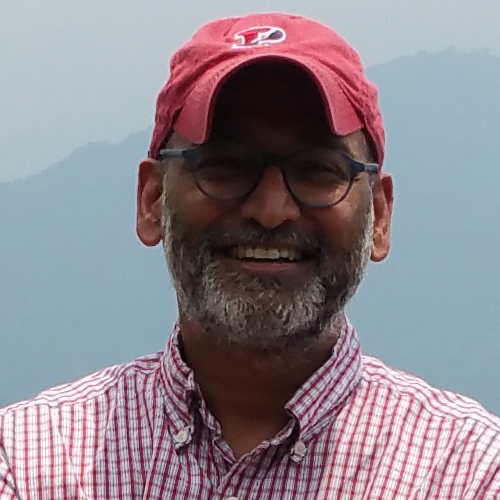And now for something completely different... Feminist Ryan Gosling...
The Duck of Minerva

Vikash Yadav
Vikash is an Associate Professor of Political Science and Asian Studies at Hobart and William Smith Colleges in Geneva, NY. His main areas of academic interest are (post-) globalization, economic development, and economic freedom, with a regional focus on South Asia
Recent Posts
R2Paternalism
by Vikash Yadav | 19 September, 2011 | Featured
The banner image of the ICRtoP (International Coalition for the Responsibility to Protect) website features a photo of seven boys under the protective gaze of a UN peacekeeper as he carries his bottled water, while other soldiers patrol ahead on the pathway that they all share together. From a structural perspective, the image is compelling because it situates the viewer as the rear-guard of the mission.Unfortunately, there is absolutely no context provided for this image on the ICRtoP website -- not even a photo credit [there is a photocredit on the "contact us" page]. Nevertheless, there...
On Rick Perry and Superman
by Vikash Yadav | 12 September, 2011 | Featured
A few thoughts from Jay Smooth on Rick Perry's favorite superhero:
Armadillo
by Vikash Yadav | 31 August, 2011 | Featured
Last night PBS' POV program aired the Danish documentary film "Armadillo" (filmed 2009; released 2010) about a Danish-British Forward Operating Base in Helmand Province, Afghanistan.Although much of the documentary portrays standard tropes and follows a time honored narrative arc from a long line of war films, Janus Metz's work sparked debate in Europe because it appeared to depict Danish soldiers "liquidating" wounded Taliban fighters and piling up the bodies to take trophy photos. Thus, as the director notes, the film challenges the notion of soldiers as heroes while also showing the ways...
The Last Mughal
by Vikash Yadav | 2 August, 2011 | Featured
Emperor Bahadur Shah IISource: Wikimedia CommonsThe din of the Great Rebellion of 1857 will continue to echo into our era, marred as it is by ongoing wars and insurgencies in Muslim lands. I believe that a careful study of those events are pertinent for American and European students of global politics today as they attempt to contextualize the challenges to American military might and Western cultural hegemony continuously pulsating onto the global stage from the remote corners of South Asia. A chronicle of 1857 is also useful to understand the fragility of a multicultural society in the...
Pirates, Hackers, and Terrorists
by Vikash Yadav | 25 July, 2011 | Featured
A hypothesis: Pirates, hackers, and terrorists are perennial actors in international relations. They will never be permanently defeated; the frontier will never be permanently settled.The underlying material reason that these actors exist is actually quite simple. Each of these (Weberian) ideal type actors emerges as a consequence of the (proto-capitalist or industrial-capitalist) overproduction and networking of standardized technologies. [I am considering them as separate types even though they may overlap in practice.] Overproduction and networking creates vulnerabilities as access is...
Demanufacturing
by Vikash Yadav | 14 July, 2011 | Featured
E-waste in ChinaPhoto Source: GreenpeaceDemanufacturing is the process of disassembling, recycling, remanufacturing, or refurbishing outdated industrial and consumer products, particularly electronics (i.e. e-waste management, asset recovery, or urban mining) but also including activities such as shipbreaking, automobile shredding, devulcanization of rubber tires, etc. The tail end of the capitalist industrial production process was traditionally relegated to developing countries in Asia, Latin America, and Africa as part of a broader ruthless and neo-racist practice of relocating polluting...
Laws of the Jungle
by Vikash Yadav | 11 July, 2011 | Featured
While rereading Kipling's 1894 classic The Jungle Book, I began to think about the curious ways in which the author constructed the relations between communities of animals in the jungle. Here are a few observations:1. The jungle is neither anarchic nor Darwinian in Kipling's narrative. It is in fact best understood as an interspecies society governed by a set of laws. To this extent, it seems to mirror the international society tradition. In Kipling's narrative, the laws are universal, but require an acknowledgment of sovereignty -- the laws must be articulated in the tongue and mannerism...
Whither the Praetorian State?
by Vikash Yadav | 6 June, 2011 | Featured
As part of a forthcoming project to re-assess the analytical relevance of the concept of the "praetorian state" in contemporary South Asian and Middle Eastern politics, I've been fascinated by tracing the history of the phrase.Although the term "praetor" or "Praetorian Guard" entered the English language from accounts of Roman history in the 13th century, the taxonomic concept (specifically as a Weberian ideal type) of the "praetorian state" first emerged after political upheavals following the Great Depression. Max Lerner argued in 1942, for example, that a socialist state that becomes...
The IMF Horse Race
by Vikash Yadav | 24 May, 2011 | Featured
The Western powers are in a rush to quickly confirm Christine Lagarde as the next MD, but there are some very good alternative choices outside of Europe who should be carefully considered. It may also be in the interest of the institution to at least appear more inclusive to the non-European parts of the world. Here is a very rushed list of candidates whom I think would be viable in the eyes of the major stakeholders at the Fund (although each one has some flaws):1. Tharman Shanmugaratnam: I remember several years ago attending this Singaporean MP's meeting with local constituents. The...